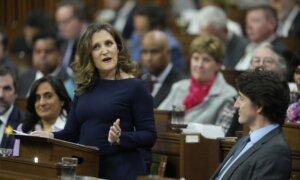Millions of Canadian men and women and hundreds of thousands of businesses face higher taxes from selling homes, stocks, and other assets in the coming years under the proposed Liberal budget, not only the super rich.
The hottest topic for economists, accountants and ordinary citizens since the Liberals presented their financial plan on April 16 has been the plan to tax a greater portion of investment profits through the higher so-called “inclusion rate” on capital gains.
The law currently requires individuals to pay tax on 50 percent of capital gains. The change will mean paying 50 percent on the first $250,000, and 66.7 percent on anything above that. Businesses will go from being taxed on 50 percent of their capital gains to being taxed on 66.7 percent.
“The increase to the capital gain inclusion rate represents the most significant revenue generating amendment from Budget 2024 and will impact many Canadians, not just the ultra-rich,” Borden Ladner Gervais LLP said on its website. “Individuals who own a single investment property or secondary residence (such as a cottage), while not necessarily the wealthiest Canadians, will now be exposed to significant additional taxes on the disposition of their property.”
The Liberals expect they’ll raise almost one-third of their five-year goal of $19.4 billion from the change this year, as people rush to sell assets before the higher tax rate kicks in on June 25. They’re also raising the lifetime capital-gains exemption, and making other adjustments for entrepreneurs.
“The boldest tax measure in Budget 2024 is the proposed increase to the capital gains inclusion rate from one-half to two-thirds for capital gains realized on or after June 25, 2024, subject to limited annual relief for individuals,” Aird Berlis, a Toronto-based law firm, said on its website.
It isn’t only the wealthy who are targeted. Even someone with low or no income who books a one-time gain exceeding $250,000 would be affected.
The Liberals estimate about 40,000 people, or 0.13 percent of the population, will pay more tax in any given year because of the increase in capital gains inclusion rate.
Many of them are now scrambling to decide if it makes sense for them to sell before the changes take effect.
That could affect not only their taxes, but also the supply of housing.
Anyone whose parent or spouse dies also risks seeing a higher tax bill if the estate is targeted by the policy change.
“This will result in a material increase in an individual’s estate tax liability,” MNP, an accounting and tax company, said on its website.
The Liberals are proposing the highest capital-gains taxes in decades to finance their increased spending on government programs and soaring debt load. It was the former Liberal government of Jean Chrétien that lowered the rate to 50 percent in 2000, where it has remained until now.
“The impact of this change will be profound, resulting in a much higher tax on death for individuals and lower after-tax return to investors and stakeholders on standard commercial transactions, and neutralizing the benefit of an attempted capital gains strip transaction,” Aird Berlis said.
What Is Changing
- The Liberals plan to raise taxes on capital gains for individuals and corporations.
When Was the Change Announced
- The Liberals announced the planned changes on April 16 as part of their proposed budget.
When Does the Change Take Effect
- If the budget is approved, the changes take effect on June 25.
Definitions
- Capital gains are your profit when you sell capital assets or property such as a home or cottage, and financial products such as stocks, bonds, and mutual funds. If you lose money on the sale, you have a capital loss.
- The inclusion rate is the portion of your profit that the government deems taxable.
- The profit is treated as income, so you pay more income tax.
Who Is Targeted
- Individuals
- Current Law: You pay income tax on 50 percent of your capital gains.
- Beginning June 25 if proposed budget becomes law: You pay income tax on 50 percent of your capital gains up to $250,000, and you pay income tax on 66.7 percent of capital gains over that amount.
- Corporations and Trusts
- Current law: Pay tax on 50 percent of capital gains.
- Planned law: Pay tax on 66.7 percent of capital gains.
Who Is Exempt
- People selling their primary residence.
- People booking gains from funds in a Registered Retirement Savings Plan, Tax-Free Savings Account, Tax-Free First Home Savings Account, or other registered savings vehicle.
Example
Let’s say you make a theoretical profit of $300,000 from selling a second home and some stocks.
If you close the deal before the tax changes, you’d pay income tax on $150,000 of the capital gain. If you close the deal after, you’d pay income tax on $158,333.
Here’s the math:
- Under current tax law if you sell by June 24: You’d pay income tax on 50 percent of the capital gain of $300,000, or $150,000. You wouldn’t pay income tax on the other $150,000.
- If proposed budget becomes law and you sell on or after June 25: You’d pay income tax on 50 percent of the profit up to $250,000, or $125,000. And you’d pay income tax on 66.7 percent of the remaining $50,000, or $33,333.
Total capital gain included for taxation: $125,000 + $33,333 = $158,333.
In their budget documents, the Liberals gave an example like that for someone earning $400,000 a year. Since the individual pays the highest marginal tax rate, under the planned changes they would pay an additional $4,461 in federal and provincial income tax.














 English (US) ·
English (US) ·  Turkish (TR) ·
Turkish (TR) ·